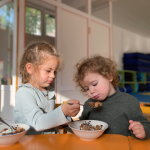Being Independent or Teaching by Living
Primary tabs
Teach me to learn independently
Maria Montessori
It is wonderful, desirable, dear, if you don't forbid pre-school children, support them so that they can run, climb, jump, learn new things without obstacles. It's not good if they are forced to have trainings, with a schedule. How can the child's personality be formed if we don't care about its demands? Isn't he/she the most important thing?
On this platform, pre-school children develop under the slogan "equal to equal" in a healthy and warm environment. The child doesn't get bored, feels big, independent and tries to develop his/her skills. The environment is transparent, visible, and there are no closed doors in the Mkhitar Sebastasi EduComplex because there is nothing to hide. I do not interfere with the children's independence. I try to capture and videotape the student's spontaneous activities in the group and outside the group.
From the first moment of entering the kindergarten, the newcomers see the independence, free activities of other children and they try not to fall behind. They are very excited when you give them a task: setting the table, going to the kitchen, helping friends, taking care of the plants, organizing breakfast and lunch, making the beds. At first, I try to get to know the new children because everyone is different: lively, sociable, adaptable, stubborn, shy. They have sisters and brothers, thanks to which they are included in the group faster. The elder sister or brother is so caring: they hold their younger simblings by their hands and introduce them to their friends, feed them, help them prepare for the bedtime ritual. All this is seen by others and they are even more excited.
The game is an integral part of the day. Children learn to think through games. The game develops ingenuity, imagination, discipline. Children live through games, learn through games, think while playing, count while playing. It doesn't matter where the game is organized. It can be organized around the table, on the floor, while going to bed, and I try to get into that game and help them. Sometimes I pretend that I don't know how to do, and they start telling me. I help them to overcome every obstacle limiting their freedom. They have to choose their own way of playing. They monitor their work, adapt to the environment, master it and gain experience. Children are with the teacher, equal to the teacher, or vice versa - the teacher is with the children, equal to the children.
The pre-school teachers summarize their work together. While watching the video films of our week summaries, we came to the conclusion that it was high time that we had our own TV program.

